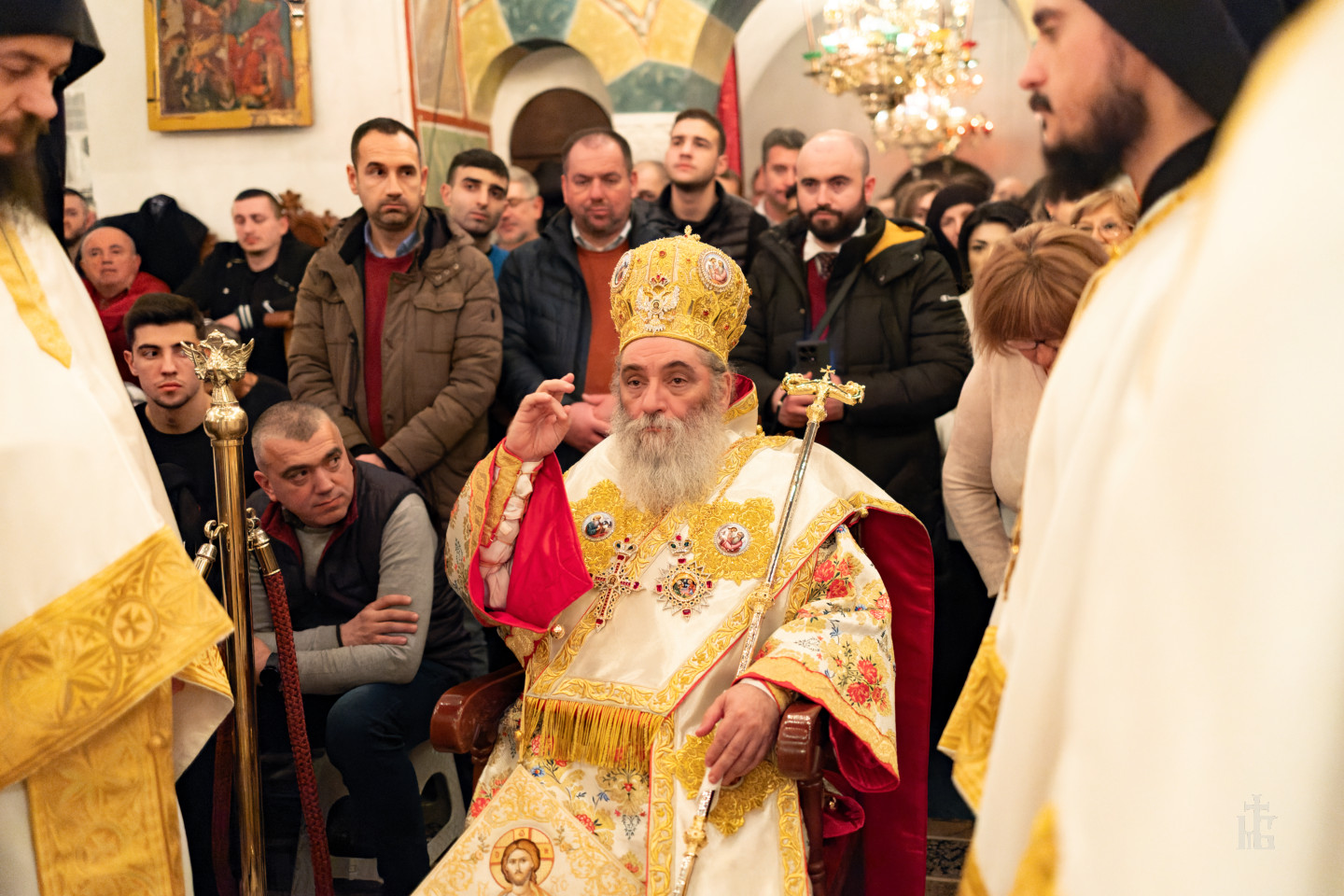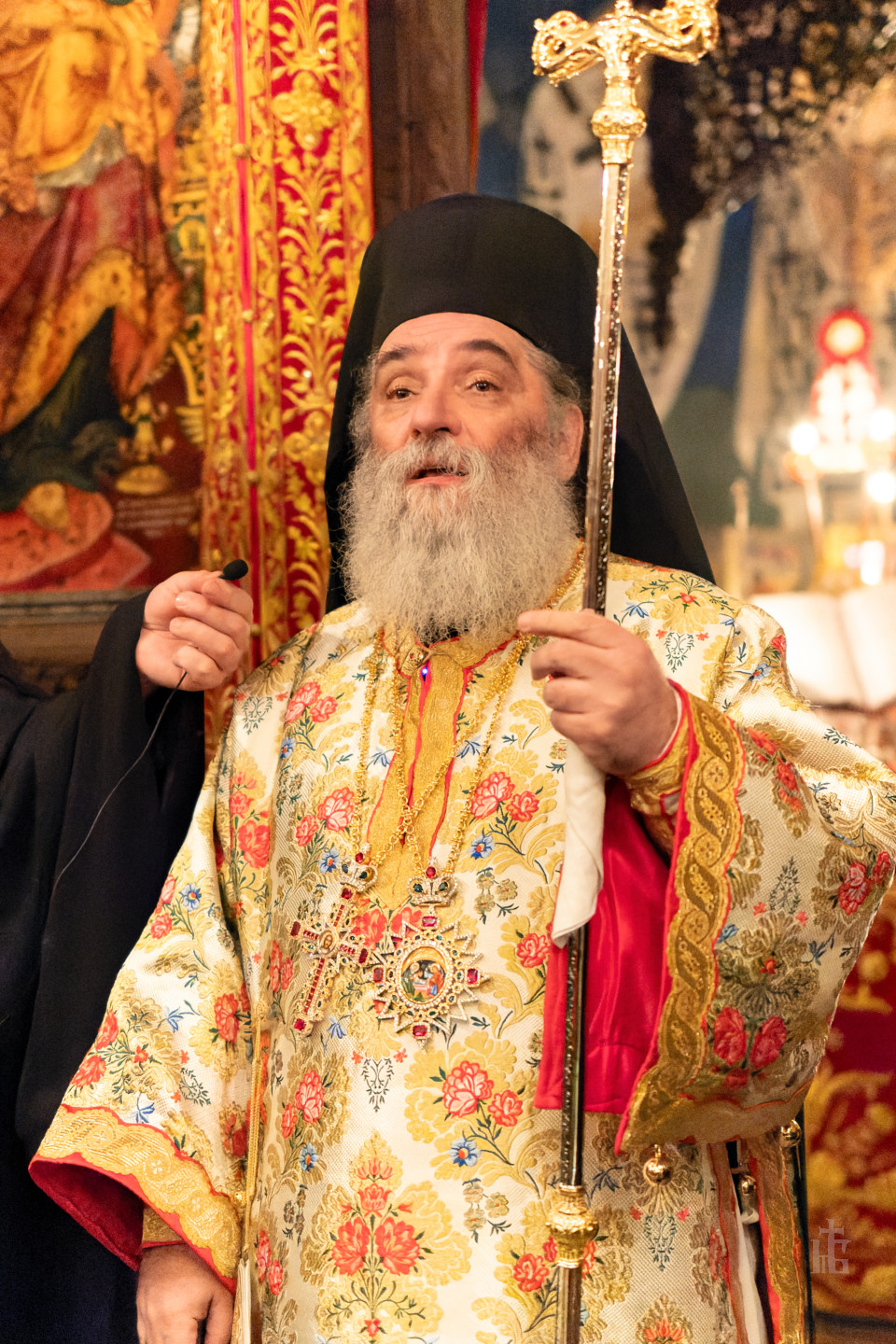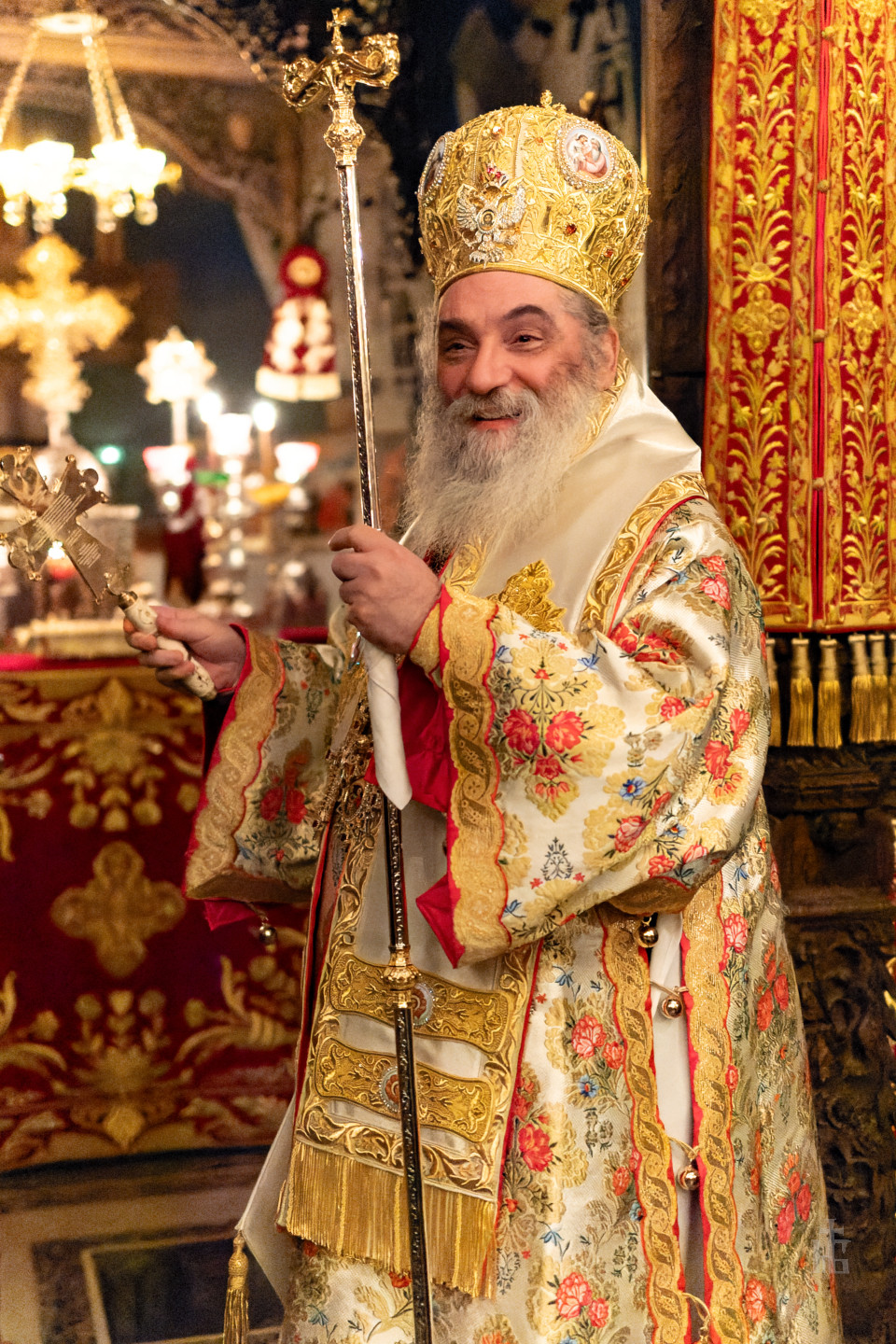A Sermon by His Grace, Bishop Parthenius of Antania, Abbot of the Holy Bigorski Monastery, delivered during the Divine Liturgy for the Feast of the Nativity of Christ
Today, my beloved, is truly a great day, filled with ineffable grace. This night is not merely another fleeting moment in our time—it is the day when God visited His world. The Nativity of Christ is the greatest and most radiant visitation that has ever occurred in human history. The Creator of all entered His own creation. The Eternal God became man—became one of us—to save that which was lost.
During the sacred service, through the beautiful festal hymns, we heard inspired words that powerfully urge us to deep contemplation. One of these hymns particularly struck me:
“Beholding man, created according to His image and likeness, who had wasted away due to transgression, He bowed the heavens and descended, and dwelt in a virgin’s womb, unchanged, to recreate within her the decayed Adam, who cries out: ‘Glory to Thy manifestation, O my Deliverer and my God!’”
Imagine this—Christ, Who is above all and over all, looks upon Adam, the symbol of fallen humanity, decayed by sin and death, and out of love, He could not remain distant. He descended, became man, to conquer death within us and to show us the path to life and deification. This, precisely, is the mystery of the Nativity: God became man so that man might become god by grace. He took the first step, accomplishing all that was necessary out of love, and now we are called to follow Him—also in love and humility. For only through humility can we overcome the old man within us, the fallen nature inherited from Adam, and ascend towards deification, towards the Kingdom of Heaven.
 Just consider how humbly Christ was born! Not in royal palaces, not in comfort and luxury, but in a poor, cold cave, amidst animals. He heard the sounds of the beasts, breathed their stench, and was laid in filthy manger. This choice was no accident. It was His way of showing us that the true path to salvation is not in pride and comfort but in humility and love. He, Who is King of all, was born in the humblest of conditions to demonstrate that we, too, can live with little, and that our strength is not in material wealth, but in the spirit. The path of humility and self-restraint is the one that overcomes the beast within us—the beast of pride, selfishness, and disobedience to God. These very passions distanced us from God when we first transgressed His commandment.
Just consider how humbly Christ was born! Not in royal palaces, not in comfort and luxury, but in a poor, cold cave, amidst animals. He heard the sounds of the beasts, breathed their stench, and was laid in filthy manger. This choice was no accident. It was His way of showing us that the true path to salvation is not in pride and comfort but in humility and love. He, Who is King of all, was born in the humblest of conditions to demonstrate that we, too, can live with little, and that our strength is not in material wealth, but in the spirit. The path of humility and self-restraint is the one that overcomes the beast within us—the beast of pride, selfishness, and disobedience to God. These very passions distanced us from God when we first transgressed His commandment.
Thus, my beloved, do you see how crucial humility is? How essential it is to follow the example of Christ, Who voluntarily descended into our weakness to conquer the old man within us and open the path to eternity? Through His Nativity, Christ granted us the opportunity to restore our unity with God, to set foot upon the path that leads to communion with Him.
God re-created man. If in the beginning, in the Garden of Eden, He once formed Adam from the dust and breathed into him the breath of life, now He has created him anew—as a new man. Christ established a new humanity, a new creation. Therefore, He declares: “Behold, I make all things new.” (Revelation 21:5) And on the Cross, at the moment of His final breath, He cried out: “It is finished.” (John 19:30) He accomplished the work of salvation in a wondrous, incomprehensible, yet so profoundly intimate way for us, human beings.
Consider this: there is nothing greater or deeper than this mystery—the Word of God was born in a humble cave and died upon the shameful Cross. This truth surpasses all human imagination. Man can conceive of anything regarding divinity—he can imagine gods of strength, power, and majesty—but never could he have conceived of a God Who humbles Himself to such an extent that He becomes man, Who is born as a helpless Child in a cave, Who dies in humiliation upon the Cross.
This truth profoundly moves me. The Gospel, in its simplicity and sublimity, is like a divine light that penetrates every aspect of human history. The parables of Christ seem so simple, yet they contain within them the profound truths of the entire world, of man, and of the Kingdom of God. Where else can such wisdom be found? In what other book? Nowhere. The Gospel stands above all books, above everything that humanity has ever created. It is a source of inspiration not only for the spiritual life but also for the highest expressions of art and culture. From it, all the great men throughout history have drawn their inspiration.
The Divine Gospel is not merely an inspiration—it is a way of life. We are called to live with the Gospel and for the Gospel. And when we look through it toward Christ, we see that the example He gave us is the example of humility. If we cannot attain the ultimate humility that He demonstrated, then let us at least strive to begin with a little humility. So many throughout history have lived in utter humility—especially the monastics, who have chosen a life of humility in order to become friends with the One Who is supremely humble—Christ Himself.
Christ is the friend of the humble, but He resists the proud. “God resists the proud, but gives grace to the humble.” (James 4:6) He did not come to correct man by force, but by love. God is love. (1 John 4:8) And that is why Christ came, became man, and spoke to us in a language we could understand. Like a loving Father, He did not address us with severity and harsh decrees, but with kindness and condescension
Earlier, during the evening service, I was deeply moved by a hymn that proclaims:
“Thy Kingdom, O Christ God, is a Kingdom of all ages, and Thy dominion is from generation to generation. Thou, Who wast incarnate through the Holy Spirit and becamest man from the Ever-Virgin Mary, hast shone upon us as Light, O Christ God, through Thy presence; Light of Light, radiance of the Father, Thou hast illumined all creation. Let every breath praise Thee, the image of the Father’s glory. Thou Who art, and Who wast, and Who hast shone forth from the Virgin as God, have mercy on us!”
Do you see, brethren? Christ is not merely the Infant born in Bethlehem; He is the Eternal God, Who created the world and the ages and Who reigns forever. Yet, for our sake, He descended and became a Child. Imagine this: He, the Almighty God, lowers Himself to the level of His creation in order to win it over and draw it near to Himself. He chose this manner, this language, through which He could communicate with His own creation.
 Every moment of Christ’s coming into the world is dramatic, deeply imbued with love and humility. From His birth in a poor and filthy cave to His death on the dreadful Golgotha—everything is filled with the utmost humility. Christ, our Savior, did not come to rule with power but to vanquish evil, to annul death, and to raise us unto eternity. He was born in a cave, among animals, to show that even in its fallen state, the world could still be a dwelling place for His salvific presence. He was crucified upon the Cross, embracing death, so that through His death, He might conquer death. And by His Resurrection, He granted us the possibility to rise with Him and to ascend with Him into the Heavens.
Every moment of Christ’s coming into the world is dramatic, deeply imbued with love and humility. From His birth in a poor and filthy cave to His death on the dreadful Golgotha—everything is filled with the utmost humility. Christ, our Savior, did not come to rule with power but to vanquish evil, to annul death, and to raise us unto eternity. He was born in a cave, among animals, to show that even in its fallen state, the world could still be a dwelling place for His salvific presence. He was crucified upon the Cross, embracing death, so that through His death, He might conquer death. And by His Resurrection, He granted us the possibility to rise with Him and to ascend with Him into the Heavens.
Why all this? Because man, created for communion with God, became estranged from Him. In the Holy Scriptures, we read of the Garden of Eden—a place of perfect harmony between God and man. Man was given but one commandment, given out of love, yet he transgressed even that. Pride and disobedience separated him from the Creator and introduced evil into the world. Death became both the consequence of sin and the means of breaking its dominion. Even to this day, death remains inevitable for us all. But after Christ’s Resurrection, it no longer has the final word. Death is no longer the end but the beginning of a new and renewed life.
The Feast of the Nativity of Christ is a call for all of us to return to the very foundation of our faith—humility, love, and communion in Christ. The Son of God, through His birth in a poor and humble cave, showed us the path to salvation not merely through words, but through His very life. Christ, Who is Himself God, accepted the deepest humility to teach us that only through humility can we be saved and deified. Now, every Divine Liturgy offers us the opportunity for this union with Christ. Through His Body and Blood, which are graciously offered to us in the Holy Eucharist, we receive our passage to the Kingdom of Heaven. Yet, to approach this great Mystery, our lives must be lives of love and humility, for everything God has done, He has done out of love for us. To be a Christian means to be a person of love, of forgiveness, of openness and compassion.

In the Gospel, Christ warns us not to judge others. Yet, despite this, we often see how we, as Christians, condemn one another. This is a deeply tragic reality. If we belong to Christ, we must never forget His example. He was born in humility and poverty to embrace all of us, to teach us that only through love and humility can we truly become His. How can we call ourselves Christians if we do not resemble Him? If we forget His humility, then we are far from Him, even when we stand within the Church or partake of the Holy Mysteries.
These past days, I was gladdened by a small but meaningful testimony, which I would like to share with you. I received an image of a text written by a theologian from Serbia, a catechist, who wrote something very beautiful and heartfelt. What particularly touched me was what he said about my spiritual children. He noted that he had never seen any of them write slander, insults, or condemnations against anyone, but that they always bore witness to love, understanding, and joy in Christ. And truly, if we belong to Christ, we will judge no one. We will bear the cross of love, reverencing the Gospel not only with words but with our very lives. We will follow the path of the Cross—the very path shown to us by the humble Child of Bethlehem, Whose birth we celebrate on this sacred night, in this holy vigil. He remains for us the most beautiful example of how we are to be transformed, how we are to open our hearts to the light of God’s love.
May this long, all-night vigil be a blessing for us all—for salvation and for peace in the world. I wish you all a living and prayerful participation in the Divine Liturgy. Let us be united with Christ through this Eucharistic sacrifice and with one another in the love that He left us as His commandment.
Many years to all of you! Christ is born!















